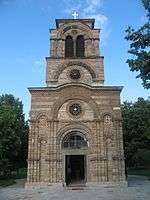Ostrog Monastery
|
Monastery of Ostrog. | |
| Monastery information | |
|---|---|
| Full name | Манастир Острог |
| Order | Serbian Orthodox |
| Established |
17th century Renovated 1923-1926 |
| Dedicated to | Saint Basil of Ostrog |
| People | |
| Founder(s) | Archbishop Vasilije |
| Site | |
| Location | Bjelopavlići plain, Montenegro |
| Visible remains | Archbishop Vasilije |
The Monastery of Ostrog (Serbian: Манастир Острог/Manastir Ostrog, pronounced [ǒstroɡ]) is a monastery of the Serbian Orthodox Church sitatued against an almost vertical background, high up in the large rock of Ostroška Greda, in Montenegro. It is dedicated to Saint Basil of Ostrog (Sveti Vasilije Ostroški), who was buried here. From the monastery, a superb view of the Bjelopavlići plain can be seen. The monastery is located 50km from Podgorica and 15km from Nikšić. Ostrog monastery is the most popular pilgrimage place in Montenegro.
History

The Monastery was founded by Vasilije, the Metropolitan Bishop of Herzegovina in the 17th century. He died there in 1671 and some years later he was glorified. His body is enshrined in a reliquary kept in the cave-church dedicated to the Presentation of the Mother of God to the Temple.
The present-day look was given to the Monastery in 1923-1926, after a fire which had destroyed the major part of the complex. Fortunately, the two little cave-churches were spared and they are the key areas of the monument. The frescoes in the Church of the Presentation were created towards the end of the 17th century. The other church, dedicated to the Holy Cross, is placed within a cave on the upper level of the monastery and was painted by master Radul, who successfully coped with the natural shapes of the cave and laid the frescoes immediately on the surface of the rock and the south wall. Around the church are the monastic residences, which together with the church building and the scenery make this monument outstandingly beautiful.
The Orthodox monastery of Ostrog is one of the most frequently visited on the Balkans. It attracts over 100,000 visitors a year. It is visited by believers from all parts of the world, either individually or in groups. It represents the meeting place of all confessions: the Orthodox, the Catholics and the Muslims. According to the stories of pilgrims, by praying by his body, many have been cured and helped in lessening the difficulties in their lives.
Architecture
Upper Monastery
The upper monastery houses the Church of the Presentation and the Church of the Holy Cross. Saint Basil of Ostrog's relics lie in the Church of the Presentation. Also of interest is the vine which grows out of the rock. It's said that it's a miracle because nothing should be able to grow out of the sheer rock face.
Lower Monastery
The lower monastery centers around the Church of the Holy Trinity that was built in 1824. It also makes up most of the monk residences. There are dorm rooms available for pilgrims here too.
Traditions
It is traditional for pilgrims to walk the 3km from the lower monastery to the upper monastery barefoot. Before entering the Church of the Presentation to pray before Saint Basil of Ostrog, pilgrims make a donation of clothing, blankets or consumables like soap for the monks. The monastery celebrates its feast day on 12th May every year. St Basil died on 29th April in the Orthodox calendar which equates to 12th May in the Gregorian calendar.
References
Sources
- Radomir Nikčević; Vesna Nikčević (2003). Ostrog Monastery. Svetigora. ISBN 978-86-7660-005-2.
External links
| Wikimedia Commons has media related to Ostrog monastery. |
- Ostrog monastery of the Serbian Orthodox Church in Montenegro
- Serbian Orthodox Church
- Ostrog Monastery tourist guide
Coordinates: 42°40′30″N 19°01′45″E / 42.67500°N 19.02917°E
Other references
- Mentioned in the 1889 novel Three Vassar Girls in Russia and Turkey on pages 75–76 as being "a seat of learning in the Middle Ages...In 1492 there was a printing-press established here, before the art of printing was in general use elsewhere. The press was used until 1852, when, during a Turkish invasion, the types were melted into bullets."
